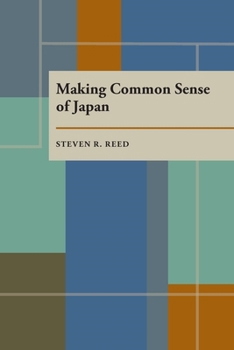Making Common Sense of Japan
Select Format
Select Condition 
Book Overview
Common misconceptions about Japan begin with the notion that it is a \u201csmall\u201d country (it's actually lager than Great Britain, Germany or Italy) and end with pronouncements that the Japanese think differently and have different values-they do things differently because that's the way they are. Steven Reed takes on the task of demystifying Japanese culture and behavior. Through examples that are familiar to an American audience and his own...
Format:Paperback
Language:English
ISBN:0822955105
ISBN13:9780822955108
Release Date:October 1993
Publisher:University of Pittsburgh Press
Length:200 Pages
Weight:0.55 lbs.
Dimensions:0.5" x 5.5" x 8.5"
Customer Reviews
1 rating
Essential reading for those interested in studying Japan
Published by Thriftbooks.com User , 24 years ago
Various movies, books, and other sources have contributed to an "eroticisation" of Japanese, its people and its culture. Steven R. Reed, in his book, Making Common Sense of Japan, sets out to dispel common myths about Japanese culture some Americans still cling to.In the first chapter, he sets out his framework by which asking whether Japan is a unique nation, and his conclusion on this may startle Americans: only when the United States is eliminated from comparison Japan is not unique. In fact, he says, it has much in common with Western European countries, with similar sizes of population and land space and that they are industrialized democracies. It is America, not Japan that is unique, in that it has a large population, land mass, and huge crime rate.The second chapter tackles the question of culture. Reed looks at why people act they way they do, and de-emphasizes rationality (this is a sticking point for rational-choice theorists, who would have a rather technical criticism of his analysis), and dispels the notion of a mystical explanation of culture. Reed's conceptualizes culture in terms of "common sense", which is simply the knowledge gained by experience. He says that too much about a country is attributed to its culture, and for this he gives the example of the use of umbrellas. Upon visiting Japan, he found it odd that many Japanese would open their umbrellas when there was a mist, and quickly attributed it to their culture (they are "wimps" or "conformist"). He found, that after walking for a short period during a mist, that umbrellas were actually quite practical, because he found that walking in a mist made the shoulders of his suit very wet. The subsequent three chapters deal with (in order) a structural learning approach, an explanation for Japanese permanent employment, and an the the nature of co-operation between government and business. The first chapter is a bit complicated, but the following two are interesting, especially in his concluding remarks of each chapter. Japanese permanent was a compromise between business and labour after World War II, which meant that in return for less worker autonomy, the unions would gain higher job security. Whether the Japanese like it or not, it's been institutionalized, meaning the cost of changing the system is higher than maintaining it. With regard to business-government co-operation, he says that "bureaucrats are the referees, not the players". He argues that some ministries lack enough enforcement power to force companies to stop cheating in the market, but more often than not, a threat is often enough to get companies to fly right. In the concluding chapter Reed argues for a "reconceptualization of the market." He goes on: "We need to recognize that markets are created by governments and can be manipulated by governments...We need to study markets as institutions, not icons." Reed also makes some remarks on what America can learn from Japan,





